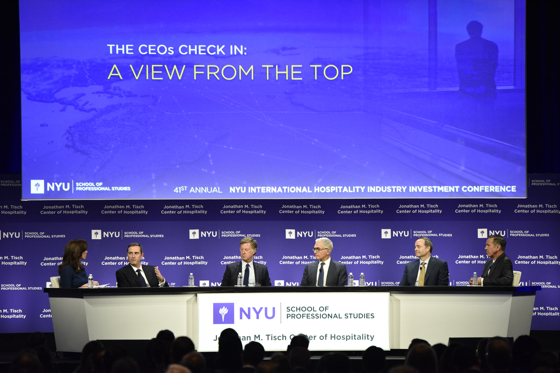The headlines from recent investment conferences have pointed to “cautious optimism.” Now it’s time to remove the “optimism” and stick to “caution.” The lights at this week’s NYU hotel investment conference were flashing amber.
Loews Hotels Chairman and CEO Jonathan Tisch opened the 41st annual event on Monday morning citing a 111-month U.S. travel boom, but he did add a tone of caution. Meetings with hoteliers, developers and asset managers were more direct, with some operators stating they were about to dust off notebooks about how to prepare for soft performance ahead. What remains unknown is how soft and for how long, with the consensus suggesting a slowdown might last a year or two. But the consensus also said 2021 is tracking very soft for group and convention business.
While Tisch invoked Intel CEO Andy Grove’s management and leadership book about how “only the paranoid survive” in reference to the industry’s need to invest in Brand USA to drive international arrivals, perhaps the same phrase is more suited to inform hoteliers who might better survive a downturn with proactive measures to drive incremental revenue, as cutting their way to sustained profitability isn’t the only route.
Nonetheless, and not surprisingly, hoteliers boasted about their pipelines and brand extensions, as that remains a big part of what these events are for.

The highlight of Monday’s opening festivities at the Marriott Marquis was the CEO panel featuring Marriott International’s Arne Sorenson, Accor’s Sebastien Bazin, IHG’s Keith Barr, Hyatt’s Mark Hoplamazian and Choice Hotels’ Pat Pacious.
The question on everyone’s mind was the health of Sorenson, who about a month earlier stated he had stage 2 pancreatic cancer. “The surreal thing is I feel great,” he told the crowd. “I have my third round of chemotherapy tomorrow at Johns Hopkins and I have a big battle ahead. I am working every day and am optimistic.”
China’s impact
From there the conversation turned to China and the potential impact of its ongoing trade war with the U.S.
Sorenson noted that despite issues, China’s shift toward consumerism bodes well for the hotel industry. “Our Bulgari hotel in Shanghai just opened and is getting US$1,000 a night, and 80% of the business is Chinese,” he said, adding that the trade situation is not leading to any changes to Marriott’s plans there.
Hoplamazian said Asia Pacific and luxury remains Hyatt’s prime focus. What gives him confidence is longer-term perspective about the Chinese market, and he believes the slowdown in Chinese outbound business will be notable but short-term. And while he is a bit concerned that Chinese investors might react negatively to working with U.S.-based brands, “it is not sensible that a backlash will have a lasting impact.”
Accor’s Bazin talked about how scale matters in China. “Within 20 years hospitality will be in the hands of Chinese,” he said, suggesting they are growing their expertise and eventually won’t need outside brands to operate their hotels. “Every year they go up the ladder, and some are taking brands away to do it themselves.”
Bazin said a wise course of action might be to accept Chinese companies increasing their domination of the marketplace and to try to penetrate the market with them. “They are too powerful for us to beat,” he added.
The major brands represented on stage also talked a lot about activating public spaces all day with ideas ranging from co-working in banquet spaces to morphing lobby bars from coffee and breakfast bites in the morning to crafted cocktails at night.
Watch for more reports with insights and specific growth plans detailed from one-on-one interviews with conference attendees later this week.

